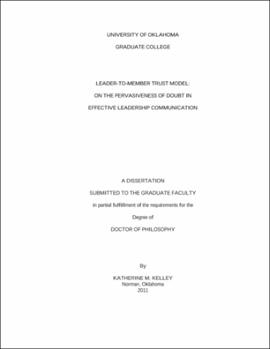| dc.description.abstract | The purpose of this research was to explore how effective leaders report trusting and doubting their members. Specifically, this investigation: (a) described how effective leaders reported making predictions of the certainty of members' role performances, and (b) cataloged the communication behaviors indicative of those predictions. Three research questions were proposed and answered by interviewing 40 working adults who had reputations for being effective leaders from diverse industries. A modified version of constant comparative analysis, a grounded theory approach, (Charmaz, 2006; Glaser & Strauss, 1967) was used with NVivo 8 to analyze the interview data and answer the research questions. Analysis of interviews revealed there is a tension between a societal Discourse of leadership trust (i.e., good and effective leaders trust their members) and the discourse of leaders (i.e., what the leaders report actually saying and doing; Tracy & Rivera, 2010). The Leader-to-Member Trust Model (LMTM) was introduced to describe how the sample of effective leaders reported coming to predictions about their members' role performances (i.e., trusting and doubting members) through six phases (i.e., selection, probation, escalation, confederation, jeopardy, and termination). The LMTM contributes to Leader-Member Exchange (LMX; Graen & Uhl-Bien, 1995) and leadership trust literature by illustrating how distrust permeates leaders' expectations of members' role performances. Implications for structuration theory are also included. | |
